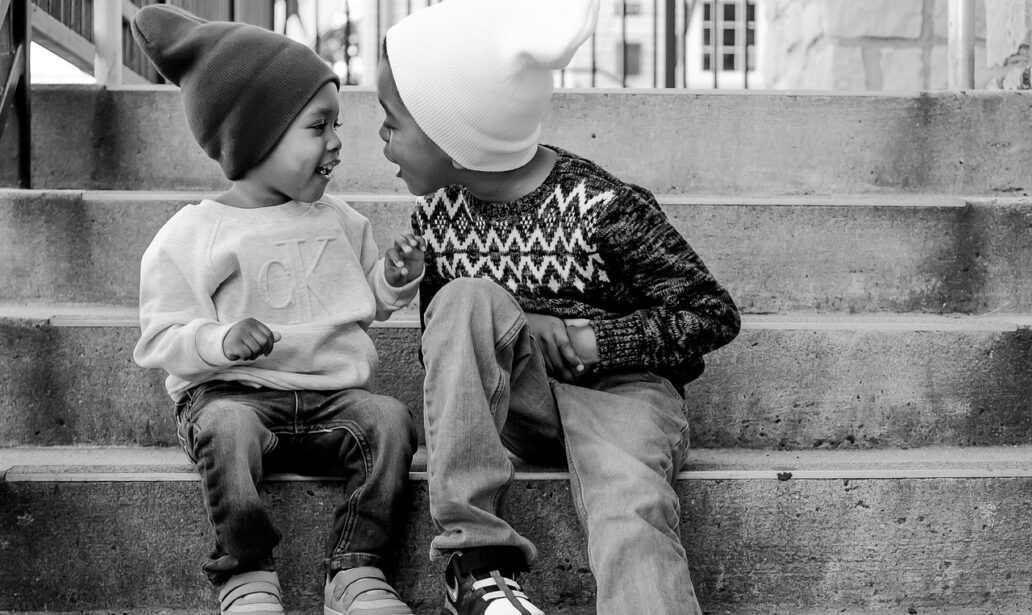For parents, providing your children with equal opportunities is a common goal. But when it comes to language development, is it really possible to provide the same input to each child? And, more importantly, does differing input cause differing language abilities between siblings?
Blake proposes that the more children there are in a family, the fewer resources there are available for each child. This may translate to more focused parental attention and higher-quality interactions for first-borns compared to younger siblings. Indeed, past research suggests language input does differ between these groups. One study found that mothers engaged directly with their 3-month-old second-born less often than with their first-born when they were the same age. Instead, these later-borns are more exposed to overheard speech, such as overhearing conversations between their mother and older sibling. As well as differences in the quantity of direct interactions provided to first versus second-borns, some research also suggests they differ in quality, with mothers producing longer utterances and more complex grammatical structures when talking to their first-borns compared to second-borns at the same age.
So, whilst parents may strive to treat their children equally, it is clear language input does differ between siblings. But what does this mean for the language development of younger siblings?
Some research suggests aspects of language development may be impacted by birth-order, particularly in early vocabulary. For example, one study found that first-born children are able to say 50 different words a month younger than their little sibling can. However, the same study found that the second-born children subsequently caught up, with no difference in the age that siblings were able to say 100 different words. This suggests that the initial delay is short-lived, and the differing language environment has no drastic impact on younger siblings’ vocabulary.

Furthermore, language consists of more than just vocabulary, and studies suggest second-borns are actually advantaged in some linguistic areas. For example, although first-borns show better grammatical ability (by being able to combine more words into each utterance), later-borns exhibit more accurate use of pronouns such as ‘me’ or ‘you’. This is likely because, unlike first-borns, they are frequently exposed to conversations between their parent and older sibling, which typically contain more pronouns than speech directed to infants, but are still accessible to children.
Additionally, second-borns tend to develop better conversational skills than their first-born siblings. They were found to respond more quickly and appropriately to their parents’ utterances, perhaps because they are used to “competing” for attention with their more linguistically adept elder sibling – something first-borns do not have to do. These findings could also relate to the early vocabulary differences mentioned earlier. If later-borns require these more advanced social skills to compete to be involved in conversations, they may be unable to take advantage of their language input until these skills develop. Another study finds that younger siblings only have a smaller vocabulary if they have multiple older siblings, not just one, which supports the idea that some delay in learning words comes from competing in conversations. However, once they develop said skills, they may then be able to learn words more efficiently, allowing them to catch up to first-borns. That said, more research is definitely required to test whether these social skills precede their boost in word learning before a strong conclusion can be made.
In short, it is completely normal for children to experience language development in different ways. So, should you feel concerned if your second-born isn’t talking as much as their older sibling did at the same age? Absolutely not! The idea that younger siblings are disadvantaged in language learning is a misconception. They may take longer to hit certain milestones, but this is typically a temporary delay. As they gain greater language exposure and develop social skills, they tend to catch up. It’s important to remember that your children will each develop their own language path. They will have different strengths and challenges and that is more than okay. So relax, parents! Your later-borns will be just fine.
References
Blake, J. (1981). Family Size and the Quality of Children. Demography, 18(4), 421–442. https://doi.org/10.2307/2060941
Hoff-Ginsberg, E. (1998). The relation of birth order and socioeconomic status to children’s language experience and language development. Applied Psycholinguistics, 19(4), 603–629. https://doi.org/10.1017/S0142716400010389
Jacobs, B. S., & Moss, H. A. (1976). Birth Order and Sex of Sibling as Determinants of Mother-Infant Interaction. Child Development, 47(2), 315. https://doi.org/10.2307/1128784
McCartney, Kathleen, et al. “Mothers’ Language with First- and Second-Born Children: A within-Family Study.” Parent-Child Relations throughout Life, Lawrence Erlbaum Associates, Inc, 1991, pp. 125–42.
Oshima-Takane, Y., Goodz, E., & Derevensky, J. L. (1996). Birth Order Effects on Early Language Development: Do Secondborn Children Learn from Overheard Speech? Child Development, 67(2), 621. https://doi.org/10.2307/1131836
Pine, J. M. (1995). Variation in Vocabulary Development as a Function of Birth Order. Child Development, 66(1), 272–281. Academic Search Alumni Edition.
Wellen, C. J. (1985). Effects of Older Siblings on the Language Young Children Hear and Produce. Journal of Speech and Hearing Disorders, 50(1), 84–99. https://doi.org/10.1044/jshd.5001.84

Olivia O’Connell
Author
Olivia is a third-year undergraduate Psychology student at the University of Bath, currently undertaking a year-long placement in the lab. She is interested in various aspects of developmental psychology, including whether shaping linguistic input can influence child language acquisition. In her free time she enjoys cooking, running and eating brunch.
Elika Bergelson
PRincipal Investigator
